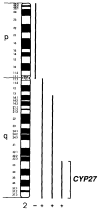Mutations in the bile acid biosynthetic enzyme sterol 27-hydroxylase underlie cerebrotendinous xanthomatosis
- PMID: 2019602
- PMCID: PMC4449724
Mutations in the bile acid biosynthetic enzyme sterol 27-hydroxylase underlie cerebrotendinous xanthomatosis
Abstract
The sterol storage disorder cerebrotendinous xanthomatosis (CTX) is characterized by abnormal deposition of cholesterol and cholestanol in multiple tissues. Deposition in the central nervous system leads to neurological dysfunction marked by dementia, spinal cord paresis, and cerebellar ataxia. Deposition in other tissues causes tendon xanthomas, premature atherosclerosis, and cataracts. In two unrelated patients with CTX, we have identified different point mutations in the gene (CYP27) encoding sterol 27-hydroxylase, a key enzyme in the bile acid biosynthesis pathway. Transfection of mutant cDNAs into cultured cells results in the synthesis of immunoreactive sterol 27-hydroxylase protein with greatly diminished enzyme activity. We have localized the CYP27 gene to the q33-qter interval of human chromosome 2, and to mouse chromosome 1, in agreement with the autosomal recessive inheritance pattern of CTX. These findings underscore the essential role played by sterols in the central nervous system and suggest that mutations in other sterol metabolizing enzymes may contribute to diseases with neurological manifestations.
Figures






References
-
- Myant NB. The Biology of Cholesterol and Related Steroids. Heinemann Medical Books; London: 1981. pp. 1–910.
-
- Norton WT. In: Basic Neurochemistry. 2. Siegel GJ, Albers RW, Katzman R, Agranoff BW, editors. Little, Brown and Co; Boston: 1976. pp. 74–99.
-
- Van Bogaert L, Scherer HJ, Epstein E. Une Forme Cerebrale De La Cholesterinose Generalisee. Masson; Paris: 1937. pp. 1–159.
-
- Bjorkhem I, Skrede S. In: The Metabolic Basis of Inherited Disease. 6. Scriber CR, Beaudet AL, Sly WS, Valle D, editors. McGraw-Hill Book Co; New York: 1989. pp. 1283–1302.
-
- Menkes JH, Schimschock JR, Swanson PD. Arch Neurol. 1968;19:47–53. - PubMed
Publication types
MeSH terms
Substances
Grants and funding
LinkOut - more resources
Full Text Sources
Other Literature Sources
Medical
Molecular Biology Databases

